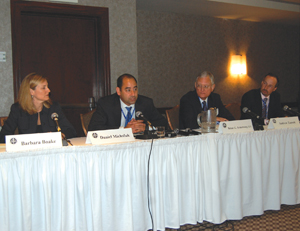As executive vice president and general counsel of Bruce Power, Brian Armstrong meets a lot of project managers.

The problem is that they’re all carrying clipboards and wearing hard hats as employees of engineering and construction firms. None of them are wearing the suits and gowns of the legal profession.
“What we’re interested in paying for is value added to the business,” Armstrong told an audience at a Canadian Bar Association conference discussion last week dealing with leadership in the area of project management.
“What I’m not interested in hearing at all is how many hours it took you to do the work. The economic model built on hourly billing simply encourages inefficiency.”
It’s clients like Armstrong that are driving more and more lawyers to embrace project management as they search for new ways to improve efficiency in an increasingly competitive market, according to another panel member, Andrew Terrett, the national director of knowledge management at Borden Ladner Gervais LLP.
“Clients want budgetary certainty; that is the key driver right now,” he said. “We see that in the [Association of Corporate Counsel’s] Value Challenge and the emphasis on alternative fee arrangements and, in particular, fixed fees.”
That message surfaced again during a speech by Richard Susskind later at the conference.
The noted author and CBA special adviser explained in a keynote closing address that in-house counsel around the world have responded to pressure from chief executives in tough economic times to get things done more efficiently by finding innovative ways to achieve more for less.
Susskind pointed to Rio Tinto, the mining company that saved US$14 million in six months after outsourcing its legal department to an Indian company. Now that they’ve seen that it’s possible, other CEOs aren’t likely to forget it, he said.
“It became clear that work can be done differently,” Susskind said. “Changes are afoot, and a return to the old ways of working is unlikely.”
Terrett, a certified project manager, said lawyers shouldn’t be afraid of the concept because they’re already doing it when they open a file by planning out the steps; deciding what should and shouldn’t be done; assessing risk; and following through on the plan.
Even in the notoriously volatile world of litigation, there are identifiable tasks and milestones lawyers can work into a plan.
“A lot of this type of thinking goes on implicitly, but project management makes it explicit and puts it in a document that everyone can see,” Terrett said.
Dan Michaluk, a partner at Hicks Morley Hamilton Stewart Storie LLP, told the audience he keeps his project plans simple and often sends them by e-mail to clients in less complex files. “I’m against having a really formal, rigid methodology,” he said. “I’m not going to complicate it.”
Armstrong, meanwhile, said he has run into difficulty with outside counsel who do more work than he wants from them by, for example, producing long opinions on legal issues at the company.
“I don’t have the time to go through them. What I really wanted was something I could read in one computer screen, summarized in five bullets, so I could make some decisions around them.”
Moderator Barbara Boake, a partner at McCarthy Tétrault LLP, said many lawyers she has spoken to struggle with the idea of producing a potentially inferior product. “You really cannot compromise quality for the sake of costs in the way a builder might be able to.
Lawyers are trained to focus on legal excellence, and cost is not a topic they have in mind.”
But Armstrong insisted that quality isn’t proportional to the time spent on a file. He also noted lawyers can improve efficiency by switching away from the billable-hour mindset and embracing alternative fee arrangements.
“If I ask a firm for a fixed price, there’s an incentive for efficiency. I’m prepared to pay a premium in order to get the price certain.”
For more on the CBA conference, see "
Nicholson offers lot of words, little substance," "
Lawyers assail crime agenda," and "
Is bilingualism merely a hobby?"
For video of the CBA conference,
click here.

 The problem is that they’re all carrying clipboards and wearing hard hats as employees of engineering and construction firms. None of them are wearing the suits and gowns of the legal profession.
The problem is that they’re all carrying clipboards and wearing hard hats as employees of engineering and construction firms. None of them are wearing the suits and gowns of the legal profession.